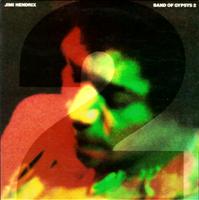| Band of Gypsys 2 | ||||
|---|---|---|---|---|
 | ||||
| Live album by | ||||
| Released | October 1986 | |||
| Recorded | December 1969 –July 1970 | |||
| Genre | Hard rock | |||
| Length | 40:23 | |||
| Label | Capitol | |||
| Producer | Alan Douglas | |||
| Jimi Hendrix chronology | ||||
| ||||
Band of Gypsys 2 is a posthumous live album by American rock musician Jimi Hendrix, released in October 1986 by Capitol Records. Produced by Alan Douglas, it followed the live mini LP Johnny B. Goode (1986), which also included live recordings from the Atlanta International Pop Festival (1970) and the Berkeley Community Theatre (1970).
Contents
The LP went out-of-print and was never released on CD, but all of the tracks are included on more recent albums, such as Songs for Groovy Children: The Fillmore East Concerts (2019), Freedom: Atlanta Pop Festival (2015), and Live at Berkeley (2003).